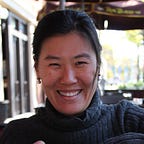Watching “Shang-Chi” with My Parents
The special-effects dragon was the most beautiful they had ever seen, they said, and in my head the reel stopped as I wondered how many iterations of stomping Western dragons (“Basically, brontosauruses that breathe fire,” said my husband later) they had had to endure before seeing a major studio attempt the true dragons of their heritage.
We watch movies with the Mandarin subtitles turned on, because my Dad is 82 and my mom is 77, and I want to reduce the friction to their enjoying English-language movies the same way I do. But my Mandarin is as yet no good beyond a few rudimentary phrases and characters, so the parts of “Shang Chi” that were in Mandarin involved my parents translating into Taiwanese and then me translating into English for my as-yet monolingual white husband.
My parents speak fluent English. They usually make an extra effort to include my husband in our conversations, speaking mostly English when he’s around. But, caught up in the East Asian world of Shang-Chi, they snapped naturally to their home language.
Sometimes I was fast enough with the remote to flip to English subtitles when the action on-screen moved entirely to Mandarin dialogue; other times I had to rely entirely on my parents’ translations, pausing it so they could explain to me what had transpired.
At one point my mom translated a line or two for us and then started to giggle. “This last part I make up,” she said. I thought of all the times I’d provided half-assed translations or said, “Don’t worry about it” in lieu of having to explain a thing fully.
I waited for the moment when they would understand that a major studio had produced a movie starring East Asian people, based on an East Asian comic book character. That they had cast the right people for the right roles. I took an odd, guilty pleasure in seeing Ben Kingsley, who has played way too many ethnicities not his own, play the comic relief instead.
Instead, my mother took some time during the movie to tell me about the legend she heard growing up, about a man lost in a mystical village full of peach trees. “This is where they pulled ‘Ta Lo’ from,” she said, about the magical village that forms the backdrop for much of the movie.
